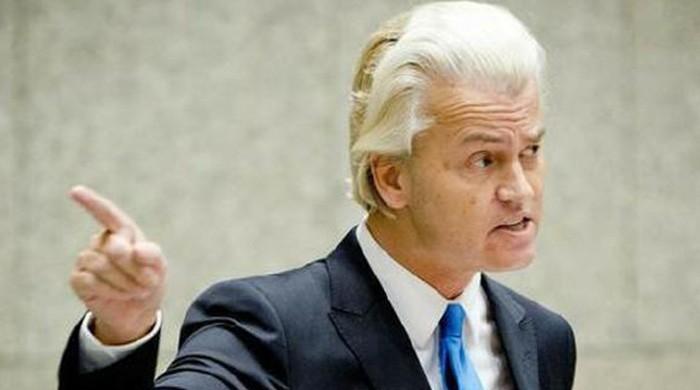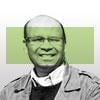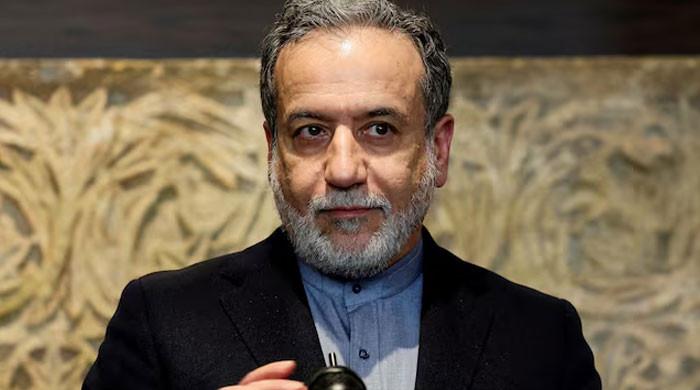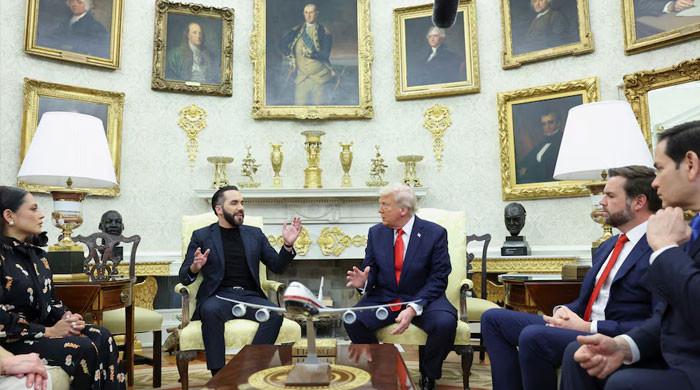Despite electoral defeat, Netherlands` far-right gaining political ground
The famous Dutch tolerance and progressiveness, if ever it existed, has turned into intolerance
March 21, 2017

Recently, Green Left Leader Jesse Klavar said Netherland's liberals have gradually adapted xenophobic and Islamophobic agenda of far right.
Klavar while speaking on his party's position on the ongoing efforts for a coalition government by VVD party of Prime Minister Mark Rutte, said that other than hostility towards migrants as major reason to remain outside the coalition government, inequality and environment degradation are two other major disagreements with the liberal preferences.
Looking closely at the recently developments here, his observations, especially in regards to the rise of Islamophobia holds substance.
The far right; populist leader known for his anti-Islam, anti-immigrants and anti-Europe stances, Geert Wilders of Freedom Party has vowed to fight back as official opposition leader. He declared election result as a "win" rather than loss to his ideas and political influence.
A man considered to be single-handedly changing the entire political landscape of his country, is poising to be more dedicated and optimist about his mass appeal.
"He wanted to lose. He got additional five seats while remaining free of implementing his nearly impossible agenda," said his brother, Paul Wilders, in an interview to a famous magazine, The Conversations.
In Netherlands today, the initial euphoria over the "great" win of center-right liberal forces has also started debate on the rise of far right - a thinking beyond the loud ‘sigh of relief’ heard all across Europe.
It was a nightmare for the liberals and mainstream European leaders here to see Wilder's potential win - setting trend for upcoming elections in France (May 2017) and Germany (September 2017). The uncertainty loomed over the fate of elections, especially after unexpected Brexit and Trump victory.
Talking to ITV News Europe, after casting his vote on March 15, 2017, Wilders said his party had left its mark on the Dutch politics, raising key issues and growing in influence.
About possibility of losing elections, he said "It would really not be a failure, because I think we’ve put our mark on the elections so far, everyone’s talking about the issues we have had and we have not had so much power over the last five years but our influence grew every day".
It is visible that the "Trump of Holland", Geert Wilders have dictated the mood of elections before, during and after the elections compelling even center right liberal People's Party for Freedom and Democracy (VVD) of Mark Rutte playing on the political chess board set by Wilders.
The first major indicator of Mark Rutte gradual shift to the far-right sloganeering came when his "open letter" stunned entire political leadership including his own party.
The letter released on January 2017 did not mentioned specifically Muslims (6% population) but it was clear who it addressed. It was termed as an effort to head off the challenge of Wilders by adapting some of his ideas and stances.
Sounding nationalist and anti-immigrant, Rutte wrote, "There is something wrong with our country. The silent majority would no longer tolerate immigrants who come and abuse our freedom". Becoming more aggressive, he wrote, "If you reject our country so fundamentally, I would prefer you leave. I have the same feeling; act normal or leave".
Earlier, he reacted to Turkish people's celebration of failed coup against President Erdogan, as saying, "my first thought is get out of here, go back to Turkey". As reported by Dutch News on September 5, 2016, Rutte said in a TV interview, "I hate the idea of a multi-cultural society."
Finally, it was his strong nationalist stance against Turkey and tense relations with Erdogan that tilted many voters in favor of his party that emerged as biggest party with 33 seats though losing 8 seats and 5% of its vote bank compare to the previous polls.
It was clear that his claim of bringing economic stability was not enough to avert the fate of Labor Party, which was routed losing 29 seats and 19% of its vote bank. The polls published before elections predicted that Freedom Party of Geert Wilders shall end up being the biggest winner with 33 seats while Rutte's party was projected to win 24 seats.
Dismissing his Open Letter, Wilders called him deceitful. "Stop deceiving your own people. It was you who caused the loss of our freedom, our security and our culture". Wilder’s Freedom party won five additional seats but lost some seats to Christian Democrats who has the same agenda but less aggressive language.
Political analyst, Dr Andre Krowel of Amsterdam's Free University, thinks that the political influence of Wilders will exacerbate in the coming days. Talking to Vice News on March 17, he said, “How did Rutte win? By basically copying Wilders in policy. He did not beat him with an alternative program. He beat him at his own game by being anti-Muslim and anti-immigrant. Do you win when you take on other people’s ideas? I’m not so sure.”
Talking about emerging fragmentation in the Dutch society, Dr Krowel said, “I think a lot of Dutch voters were looking for security and a sense of protection, and what they’ve got is actually the opposite. They have created a very fragmented landscape.
“Wilders pushed right-wing issues to the political agenda, and siphoned seats from the mainstream parties, so they will need to govern somehow alongside the progressive left … Wilders will now have a field day holding them accountable while they try to govern alongside parties who don’t agree with these policies.”
It seems that entire center right, center left, democratic and liberal political forces had to respond to Geert Wilders and his divisive nationalist agenda - An anti-Islam, anti-immigration, anti-Europe, anti-Moroccans, anti-Turkish, anti-establishment and anti-diversity stance.
The murder of Pim Fortuyn, by a radical leftist, in 2002 was the first incident that jolted Netherlands. A professor of sociology, Fortuyn fought elections on anti-Islam, anti-immigrants’ slogan and his party won 26 seats and made government with Christian Democratic Appeal and People's Party for Freedom and Democracy.
After that the murder of film maker, Theo Van Gough by a Dutch Moroccan in November 2004, brought the people out of denial of the rising divisions in the society.
Later, an atheist author and member of the Dutch parliament, Aayan Hirsi Ali, stirred a big controversy over her criticism of female genital mutialation and declaring Islam "an enemy of peace".
She collaborated with Theo Van Gough in Making a film, "Submission" about the repression of women under Islam. She had to leave Nederland after a controversy over her citizenship. The film by Geert Wilders, Fitna in 2008 compared Islam with Nazism claiming that Islam motivated everybody disagreeing with its teachings. The Fitna helped making his identity as a threatened leader who needed 24/7 heavy security.
According to Paul Wilders, the elder brother of Geert Wilders, who turned against him after the film Fitna, "far right has also impacted and inspired centre right parties especially Christian Democrats and People Party for Freedom and Democracy.
The famous Dutch tolerance and progressiveness, if ever it existed, has turned into intolerance and a prolonged and painstaking search for Dutch identity. Public debate has taken a nasty turn, blaming and shaming “foreigners”, Muslims mostly, but also the elite and Europe for the problems people experience.
This opened up tensions and rifts which had previously been covered by a soft blanket of “political correctness”, which used to be regarded as civilized behavior but is now seen as treason and deceitfulness". "what matters is that he is tapping into the anxieties of many voters", said Paul Wilder as quoted by The Conversations.
Talking to Geo News, Amer Morgahi, anthropologist in Amsterdam University refused to declare the recent election result as the victory of liberals. He said liberals in Netherlands, and perhaps all across Europe had adapted the racist and Islamophobic agenda of the far right promoting an exclusive agenda of dominant cultural discourse.
He said liberals had discredited the multi ethnic politics by criminalizing the Muslim migrants. He mentioned Mark Rutte pronouncement of Wilders populism as "wrong kind of populism" meaning he had the "right kind of populism". He said, "By adapting Wilder's program and rhetoric, Rutte has ensured his dominant position in Dutch politics. It means that we will continue facing far right political agenda, though in softer political jargon, in future", he concluded.












